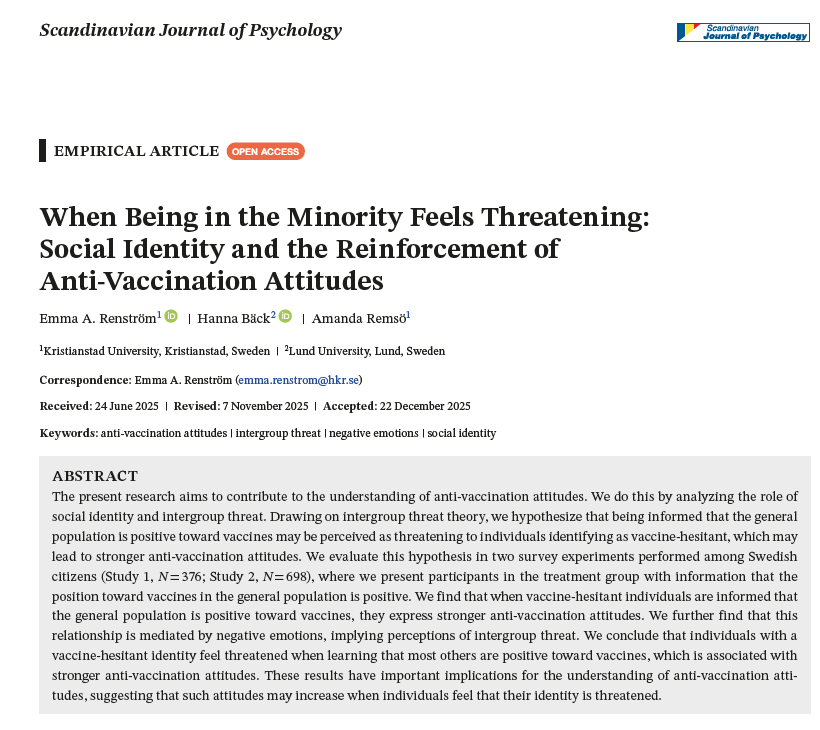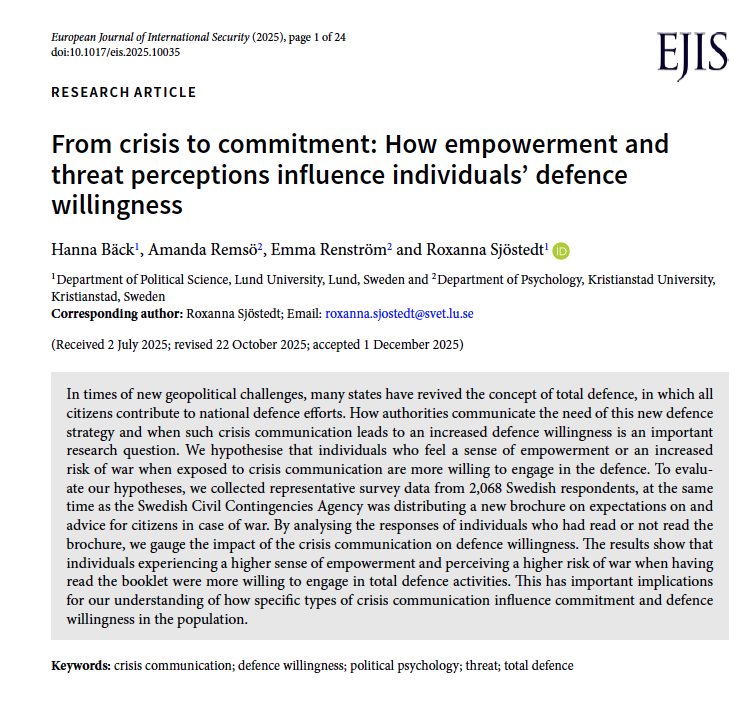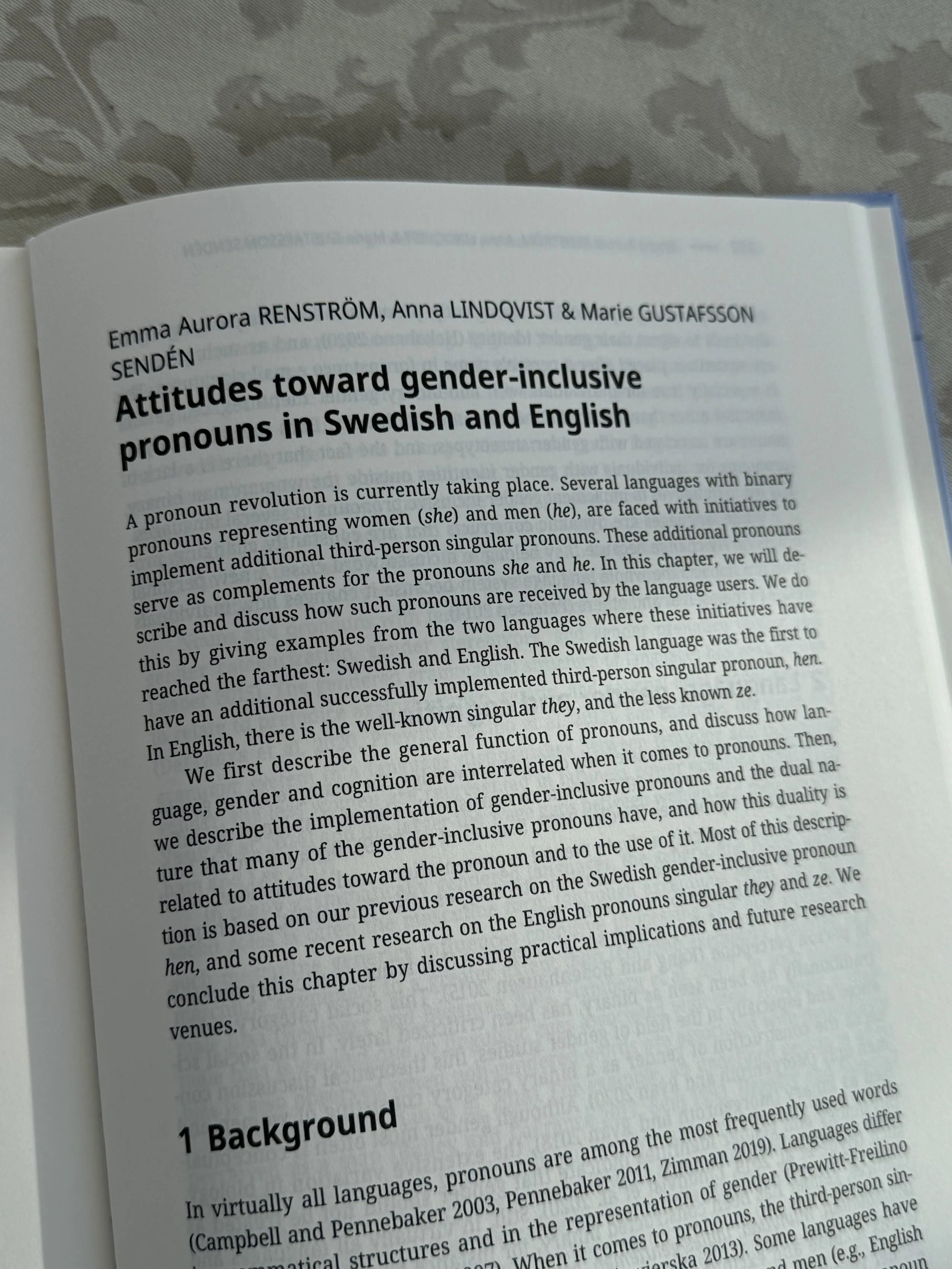In a new article published in Scandinavian Journal Of Psychology, we tested if intergroup threat leads vaccine-skeptic individuals to reinforce their attitudinal position in two experiments. We find that such threats do increase anti-vaccination attitudes. The article is open access here.
New paper on crisis communication and defense willingness
Together with Roxanna Sjöstedt, Lund University, Hanna, Emma and Amanda recently published a paper focusing on crisis communication and defense willingness among Swedes. The paper, published in European Journal of International Security, is open access here.
New project on manfluencers and violence against women
Yesterday, we were informed that our application was granted funding for three years, for a project focusing on the role of manfluencers in violence against women. The project is funded by Vetenskapsrådet. Below is a short abstract of the proposal.
Manfluencers and young men’s violence against women
Despite broader social progress, violence toward women and girls in heterosexual relationships is increasing. Concurrently, misogynistic attitudes are surging, particularly among young men in the Western world. Research indicates that these attitudes, especially the dehumanization of women, are linked to violence. This connection suggests that the rise in misogyny may help explain why some young men perpetrate violence against women.
While Sweden is often regarded as highly egalitarian, recent research suggests an ongoing backlash against gender equality. Notably, Sweden has the highest per capita number of active users on misogynistic online forums. Social media plays a crucial role in shaping young men's political attitudes, with manfluencers like Andrew Tate promoting narratives that depict women as subordinate. This project seeks to answer: How do manfluencers affect the dehumanization of women and the likelihood of violence toward women among young men?
The concerning trends of rising misogyny and violence against women among young men highlight the urgent need for new knowledge in this area. Our interdisciplinary research team, with expertise in psychology and political science, is well-equipped to address the research question. Using a research design that combines interviews with perpetrators, large-scale surveys, and social psychological experiments, the project will provide both in-depth insights and generalizable findings that can inform intervention strategies.
New article focusing on social reinforcement of anti-vaccination attitudes
The paper, The Social Reinforcement of Anti-Vaccination Attitudes: How Perceived Support Strengthens Vaccine Hesitancy Through Group Identity Processes, can be found here. It war recently published in Journal of Applied Social Psychology.
Abstract
Vaccine hesitancy and anti-vaccination attitudes are becoming increasingly problematic in several Western countries where diseases that were nearly extinct are coming back. We here explore the role of perceived social support in understanding anti-vaccination attitudes. We argue that perceptions about having social support for one′s position may influence anti-vaccination attitudes among some social groups. More specifically, we argue that individuals who identify as vaccine hesitant and perceive to have high social support will likely be strengthened in their anti-vaccination attitudes. In a representative survey (N = 1660) performed among Swedish citizens, we find that stronger identification as vaccine-hesitant is associated with a biased perception that social support for one′s position is stronger than it is. In an experiment (N = 794), we manipulate social support for vaccine hesitants, such that participants are informed that an increasing part of the population is becoming more negative to vaccines and vaccinations. We find that social support leads to positive emotions among individuals who identify as vaccine hesitants, which in turn is associated with increased anti-vaccination attitudes. The results have important implications for how anti-vaccination attitudes may spread and cement among the public based in identity concerns as well as cognitive biases.
Chapter on threats and emotions in new handbook of affective polarization
In a recently published handbook, edited by Eelco Harteveld and Mariano Torcal, Emma and Hanna write about emotions and threats in relation to affective polarization (ch. 13). The handbook is published open access and can be found here.
Does climate change threats increase affective polarization?
We explore the role of climate change threats on affective polarization in this new article in Analyses of Social Issues and Public Policy.
Why are men more negative against gender-inclusive language?
In a recently published paper, we find that this is likely due to men being more sexist compared to women. Using survey data from 2015 with almost 5000 respondents, we find that men’s stronger resistance against gender-inclusive pronouns, such as Swedish hen, is mainly connected to sexist beliefs.
The paper is published in the Journal of Language and Social Psychology.
New research assistant
Natasha Nowicka recently joined our team as a research assistant, supporting our current projects in political psychology with a focus on political polarization, gender, and climate attitudes. Natasha holds a BSc in Psychology from the University of California, San Diego, and an MSc in Psychology from Lund University. She has a strong interest in statistics and its application to the behavioral sciences. Her master's thesis employed a meta-analytic approach to examine the relationship between language proximity and the bilingual advantage. Natasha also has prior experience working as a research assistant on language and developmental projects, fMRI studies related to social anxiety, and research focused on community-based outreach for at-risk populations.
We are hiring!
We are currently looking for a research assistant. If you are interested, apply here.
New overview article on the implementation of neo- and nonbinary pronouns
This article was just published in Frontiers.
New grant for research on the political polarization of climate change!
The Marianne and Marcus Wallenberg foundation will finance a project where we explore the political polarization of climate change. The project is a collaboration between Emma, Hanna, Amanda and Fredrik Björklund at the Department of Psychology, Lund University.
Why are men more skeptical of climate change than women?
In a new paper in Frontiers, we use Swedish survey data and find that this can be explained by feeling that one’s masculinity is threatened.
Manfluencers and young men's misogynistic attitudes
This paper was recently published in Sex Roles by Emma and Hanna. We find that young men in particular seem to be threatened by manfluencer content framing women’s progress as threats, and react with misogynistic attitudes.
Ideological origins of resistance against gender-inclusive language reforms: Singular they as a de-gendering or multi-gendering strategy
In this new paper, which was just published in Political Psychology, we show that attitudes and use of gender-inclusive pronouns, such as singular they, is largely determined by individual level ideology. Specifically, we find that RWA predicts negativity towards singular they for nonbinary identities while SDO predicts negativity towards singular they for generic use.
New article about gender stereotypes in Sweden
Emma recently published an article exploring gender stereotypes in Sweden in Scandinavian Journal of Psychology.
This study investigates prescriptive (how women and men should be) and proscriptive (how women and men should not be) gender stereotypes in Sweden and how these stereotypes relate to self-ascribed gendered traits. In an online survey with students at three major universities (N = 679) it was found that participants believed that the societal view was that women should be more communal than men, but less dominant and men should be more agentic than women, but less weak. In comparison, self-ratings only differed for communion, such that women rated themselves as more communal than men (there were no differences in self-ratings of agency, dominance, or weakness). Thus, prescriptive and proscriptive stereotypes and self-views differed. Women mainly perceived differences between self-ratings and prescriptions of communion, whereas men mainly perceived differences between self-ratings and prescriptions of agency. Moreover, women mainly perceived differences between self-ratings and proscriptions of dominance, and men mainly perceived differences between self-ratings and proscriptions of weakness. Hence, both women and men perceive larger gaps between self-evaluations and societally desired and undesired gender stereotypical traits. Future studies should investigate the consequences of such mismatches.
New book on Attitudes towards gender-inclusive language
Emma recently contributed with a chapter to a new edited volume on Attitudes towards gender-inclusive language, edited by Falco Pfalzgraf.
Intergenerational altruism and climate policy preferences
In April, Gustav, Sofia, Hanna and Emma published a paper on intergenerational altruism and climate policy preferences in PNAS Nexus. Find the paper here.
Abstract
Climate mitigation constitutes an intergenerational moral dilemma; the decisions we make today will inevitably shape the prospects for generations to come. Yet, we still know little about the relationship between intergenerational altruism (IGA)—our concerns for the well-being of future generations—and support for costly climate mitigation policies. In this study, we present an approach to measuring IGA through an intergenerational dilemma, where participants allocate resources across generations. First, we describe how IGA depends on the temporal (social) distance between generations and demonstrate robust correlations between IGA and support for several climate policies. Then, we leverage randomized participation in the intergenerational dilemma to show that it causally increases climate policy support, an effect we attribute to higher worries about human-induced climate change among treated subjects. An exploratory heterogeneity analysis suggests that the impact of the intergenerational dilemma is primarily driven by female and nonbinary participants. In sum, this study presents both a novel measurement strategy and robust evidence of a malleable moral basis of climate policy preferences.
New book on social exclusion and extremism
The newly published book “Exclusion and Extremism. A psychological perspective” edited by Michaela Pfundmair, Andrew Hales and Kipling Williams contents a chapter by Emma and Hanna.
Left and right's climate support affected differently by cost increase
Sofia Henriks, co-author of our recent paper in Ecological Economics has written for ECPRs The Loop.
Women favour climate actions that benefit future generations more than men
We wrote a short piece for The Conversation about a new study that was just published in PNAS Nexus together with Gustav Agneman and Sofia Henriks.
The original article can be found here.





















